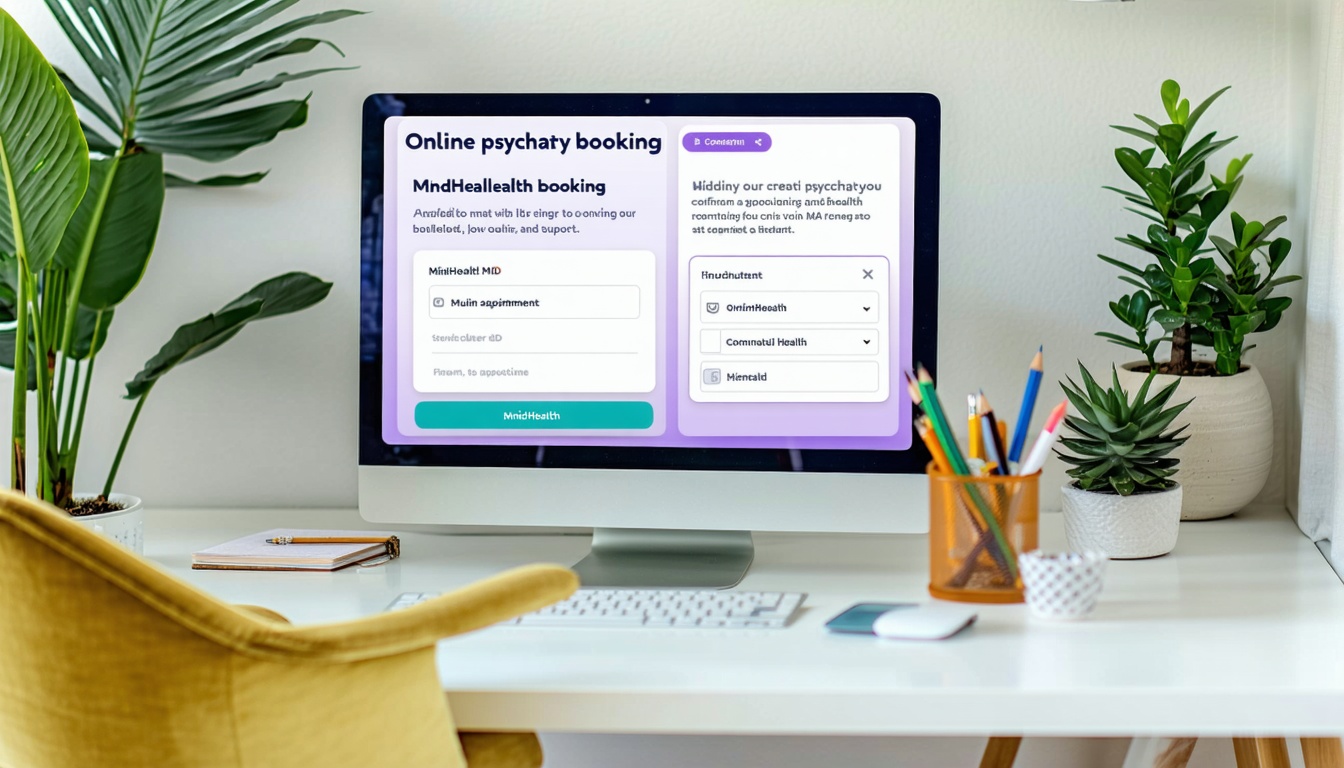You know how tough it can be to watch a child struggle with emotional or behavioral challenges. Imagine waking up one morning and realizing your child needs professional help right away—but you’re not sure where to turn. That’s where child psychiatry immediate access becomes a lifeline, giving you a fast route to specialized care. Quick intervention can reduce the risk of more serious issues down the road, and it starts by knowing your options.
In fact, therapy delays are more common than many people realize. About 53% of psychologists in a 2024 survey reported having no openings for new patients at certain points, which can leave families feeling stuck [1]. And because mental health challenges can escalate quickly, immediate help is often the difference between mild symptoms and a crisis situation. By choosing a provider that offers same-day or next-day appointments, you ensure your child gets the professional attention they need without waiting weeks or months.
In this post, we’ll walk through common barriers to quick care, explore telehealth psychiatry, and show you how MindHealth MD specializes in delivering the rapid, comprehensive services that help kids and teens thrive. Along the way, you’ll pick up practical tips to secure urgent assistance when every day counts.
Understand why immediate child psychiatry matters
Children and adolescents face a range of mental health issues such as anxiety, depression, attention-deficit/hyperactivity disorder (ADHD), and more. In some regions, up to 20% of young people have a mental illness that seriously affects their everyday activities, according to global estimates [2]. The sooner they get professional support, the better their chance of minimizing long-term complications—like worsening symptoms, academic setbacks, or strained family relationships.
Early treatment often translates into:
- Reduced emergency department visits
- Lower risk of self-harm
- Improved quality of life and emotional health
- Fewer disruptions to school and social life
When your child can’t sleep due to anxious thoughts or is increasingly moody, a rapid consultation can head off a more severe issue. An immediate session may catch underlying conditions before they spiral.
How delays affect outcomes
You might be wondering, “Is a few weeks’ wait really such a big deal?” Research suggests that delayed treatment can make mental health conditions more difficult to address—and could increase the likelihood of hospitalization [3]. For a young person, prolonged distress can lead to gaps in learning, social isolation, or risky behaviors. The more time that passes, the more these problems can compound.
Recognize key barriers to quick care
In an ideal world, scheduling child psychiatry would be straightforward. But many families encounter hurdles:
- Limited availability of specialists
- Insurance coverage gaps
- Stigma around seeking mental health support
- Geographic distance to child psychiatrists
- Financial constraints
Because of these challenges, some parents head to the emergency department (ED) for nonemergency mental health concerns. About 8% of ED visits are related to psychiatric issues [1]. Unfortunately, families in those situations often face long wait times or receive incomplete follow-up care after an ED discharge.
Shortage of child psychiatry professionals
A lack of specialty providers is a big factor. In many nations—like Nigeria and Taiwan—there’s a shortage of trained child and adolescent psychiatrists [4]. Even in places where there are more practitioners, the high demand can leave waitlists several weeks long. This means children might not see anyone until their symptoms have become deeply ingrained or escalated to a crisis level.
Insurance and coverage difficulties
The cost of services is another stumbling block. While some clinics accept multiple insurance plans, many families remain underinsured or find higher copays for mental health appointments. This can push them to delay care, hoping the problem sorts itself out. If you’ve faced these frustrations, it’s important to look for in network psychiatry care to reduce out-of-pocket expenses and speed up access.
See how telehealth transforms psychiatry access
Fortunately, technology has opened new doors for families seeking immediate help. Thanks to telehealth solutions, you no longer have to travel hours to see a specialist in person. Virtual appointments let you connect with board-certified psychiatrists and therapists via secure video right from your home.
What makes telehealth especially valuable?
- Shorter wait times: Specialists can serve more patients by eliminating commute times and office overhead
- Convenience: Your child can participate from a familiar, comfortable environment
- Easy scheduling: Later appointment slots may be available, fitting around school or extracurricular activities
- Streamlined follow-ups: Virtual check-ins can happen more frequently, without major disruptions
Boosting the provider’s capacity
The more psychiatrists can manage routine medication checks and counseling sessions remotely, the more time they have for urgent cases. Imagine your child having the option of a virtual psychiatry session or a telepsychiatry appointment when anxiety spikes or ADHD symptoms suddenly intensify.
Research indicates that provider consultation programs have improved confidence in primary care doctors addressing childhood anxiety and depression [3]. Telehealth ensures consistent consultation channels, so your child’s primary care provider can instantly involve mental health experts whenever necessary.
Explore MindHealth MD’s specialized approach
So how does MindHealth MD stand out? With a robust team of mental health experts, modern treatment modalities, and flexible scheduling, this practice is designed to give families immediate access to evaluation and therapy options. Their key offerings include telepsychiatry, Medication Assisted Treatment (MAT), Transcranial Magnetic Stimulation (TMS) for stubborn depression, and advanced diagnostic tools like EEG.
Below, you’ll find a quick snapshot of how MindHealth MD’s approach meets the growing need for fast, quality child psychiatric services.
Try telepsychiatry and same-day sessions
When your child suddenly experiences a crisis—maybe they’re feeling withdrawn, or they’re complaining of constant worry—you can schedule a same day psychiatric evaluation or even aim for 48 hour psychiatry booking if same-day doesn’t fit your schedule. MindHealth MD’s telepsychiatry service makes it simpler to hop online and get professional advice quickly.
- It offers weekend appointments for urgent scenarios.
- The team can coordinate with your child’s school counselor if needed.
- If a medication adjustment is required, e-prescriptions can be sent promptly to your local pharmacy.
Given how quickly child symptoms can worsen, these telepsychiatry sessions can be the difference between a smoother recovery and an emergency department visit.
Consider medication assisted treatment for young people
Substance misuse isn’t just an adult concern. Adolescents may experiment with substances, only to find themselves trapped in cycles of addiction. MindHealth MD provides medication assisted treatment to address issues like opioid dependencies. While MAT is often discussed for adults, older teens might also benefit under close supervision. For instance, in certain cases, mat for opioid addiction or mat for alcohol dependency can be combined with therapy tailored to adolescents’ emotional and developmental needs.
By integrating MAT with counseling, families see:
- Fewer urgent care visits
- Stabilized moods and reduced cravings
- An organized plan to support school performance and social life
Use TMS therapy for depression
When therapy and medication don’t fully ease severe depression, TMS (Transcranial Magnetic Stimulation) can offer hope. MindHealth MD has proven experience in tms therapy for depression. TMS uses magnetic pulses to stimulate brain regions linked to mood regulation, providing relief from treatment-resistant depression.
Many parents appreciate that TMS:
- Is noninvasive and typically well-tolerated
- Does not require anesthesia
- Allows kids to maintain their daily routine, with minimal downtime
To find out if your child is a good candidate for TMS, you might schedule tms treatment or visit transcranial magnetic stimulation providers for more details.
Rely on EEG-based insights
From ADHD to mood disorders, many child psychiatric conditions tie closely to neurological patterns. An eeg brain mapping test examines brainwave activity to reveal whether certain regions are over- or underactive. By combining an EEG with behavioral evaluations, psychiatrists at MindHealth MD can refine diagnoses and individualize treatments. You can learn more by checking out eeg diagnostic for mental health if you’re curious about how electrical signals in the brain can inform better therapy approaches.
Secure immediate access for child psychiatry
If you’re feeling the urgency of your child’s emotional and behavioral issues, here are some straightforward steps to expedite professional assistance:
- Contact clinics offering urgent appointments: Look for providers that highlight immediate psychiatry appointment or mental health urgent appointment on their websites.
- Use telehealth: Telehealth is often faster than in-person visits. You might explore a telepsychiatry appointment if you’re stuck on a waitlist for in-office care.
- Ask about insurance acceptance: Being in network psychiatry care can cut costs and remove red tape. Always verify if your plan is accepted.
- Keep an eye on medication management: If your child is already on psychiatric medication, ensuring you can reach a prescriber quickly for adjustments is crucial. MindHealth MD provides responsive psychiatric medication management to handle dosage tweaks without a long wait.
- Stay open to integrated services: A lot of mental health conditions in kids can overlap or coincide with other issues. For instance, ADHD and depression can occur together. By choosing a provider with multiple treatment options, you reduce the need for multiple referrals.
Tips for a swift intake
- Complete online intake forms in advance if possible. This helps your care team prepare for your child’s specific needs.
- Gather medical records, notes from teachers or school counselors, and any prior evaluations to streamline the diagnostic process.
- Be clear and concise when describing symptoms. This clarity helps the psychiatrist quickly pinpoint the right approach.
Embrace integrated mental health solutions
Why does integrated care matter? In a holistic model, physicians, psychiatrists, and therapists work together to handle both the physical and emotional sides of your child’s well-being. A child with depression could also have asthma. Rather than juggling appointments across multiple providers, integrated care means a coordinated team addressing each condition.
Studies have shown that interdisciplinary care improves physical outcomes—like better asthma management and stabilized blood pressure—and supports emotional health [5]. For instance, if your child has both ADHD and a co-occurring mood disorder, integrated practitioners ensure medications don’t conflict and therapies are consistently reinforced at home and at school.
Coordinating with schools and community programs
Many school systems now provide mental health support, especially if a child’s condition affects their academic performance or social interactions [6]. Partnering with your child’s psychiatrist and educational staff can offer:
- In-school counseling
- Adjusted academic plans
- Peer support groups
- A full wraparound system ensuring continuity of care
MindHealth MD practitioners encourage open communication with family members and school personnel to give each child the scaffolding they need.
Frequently asked questions
How does telehealth help secure immediate appointments?
Telehealth removes the travel and facility constraints that often cause scheduling bottlenecks. By connecting through video, you’ll find more availability, plus you can avoid long drives and waiting rooms. This means faster help—which is crucial when a child is in distress.
Can child psychiatry treat co-occurring disorders?
Yes. Co-occurring conditions, also called dual diagnoses, happen frequently in children. For instance, anxiety can appear alongside ADHD. A comprehensive approach—like co occurring disorders treatment or a dual diagnosis psychiatric program—is critical. MindHealth MD’s team evaluates every angle of your child’s symptoms to design an integrated therapy plan.
What if my child has a crisis at school?
Many parents feel helpless when that phone call comes from a teacher or guidance counselor. First, ensure your child receives immediate medical attention if they’re presenting any risk of harm. If it’s not life-threatening, you might schedule a mental health urgent appointment. MindHealth MD can partner with educators to recommend classroom supports or structured interventions to keep your child safe and engaged.
Does MindHealth MD accept insurance coverage?
Yes. Being in network psychiatry care is central to making mental health support more affordable. Check your insurance benefits to confirm coverage. If you’re without coverage or prefer to pay directly, you can also look into a self pay psychiatry session.
How quickly can my child see a psychiatrist?
With MindHealth MD, you can often secure a same day psychiatric evaluation or book within 48 hours. While specific appointment times vary, telehealth expands the practice’s capacity, letting you bypass extended waitlists you might find elsewhere.
Summary and next steps
Securing help at the right moment can feel like navigating an obstacle course. But immediate access for a child’s psychiatric care is within reach when you know your resources. Telehealth and flexible scheduling have narrowed the gaps that used to delay essential treatments. With MindHealth MD’s specialized services—from same-day telepsychiatry appointments to advanced EEG diagnostics, TMS, and medication assisted programs—you’ll have an entire system set up to protect your child’s emotional stability.
Here’s a quick recap of what to do next:
- Reach out for a same day psychiatric evaluation if your child’s symptoms escalate unexpectedly.
- Double-check your insurance to find out if MindHealth MD is in network psychiatry care.
- Ask about telehealth options like a telepsychiatry appointment to avoid long wait times.
- Consider specialized interventions such as tms therapy for depression if your child has treatment-resistant symptoms.
- Explore integrated care so your family benefits from a cohesive mental, emotional, and physical health support system.
Remember, child psychiatry immediate access could change your child’s life story by tackling tough issues early. Getting the right help quickly isn’t just about preventing crises—it’s about giving your child the chance to grow, learn, and enjoy a healthy life, free from the constraints of untreated mental health challenges. If you’re still on the fence, it never hurts to book a consultation and talk to an expert. That one step might be the turning point your child needs.








